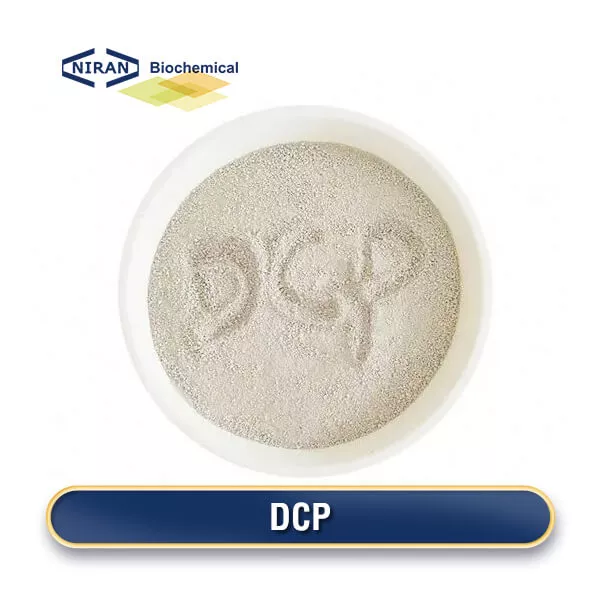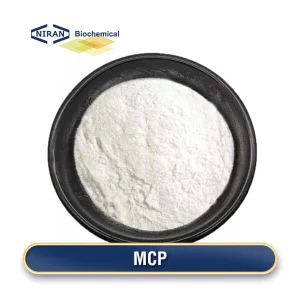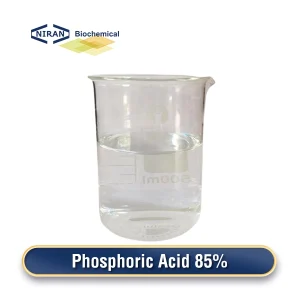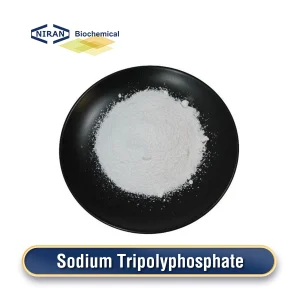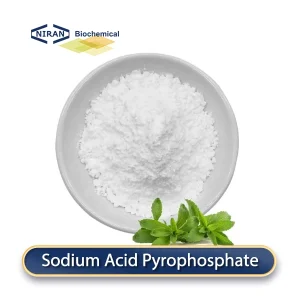Niran Biochemical
YOUR RELIABLE FOOD INGREDIENTS
Send Inquiry
Home » Products » Phosphates » DCP—Dicalcium Phosphate
DCP—Dicalcium Phosphate
- CAS: 7757-93-9
- Chemical Formula: CaHPO4
- Certification: KOSHER, ISO, HALAL, FSSC22000, BRC, etc.
- Standard: GB 1886.3-2016/FCC VII
- MOQ: 1000KG
- Shelf Life: 2 Years
Inquire Product
Product Description
What is Dicalcium Phosphate?
Dicalcium phosphate is an inorganic compound with a white crystalline powder appearance. It is somewhat soluble in water, insoluble in ethanol, and readily soluble in diluted hydrochloric and nitric acids. It is a common addition to food.
There are two mainstream methods for producing Dicalcium phosphate in China. One is to dissolve phosphoric acid (usually phosphoric acid or sodium dihydrogen phosphate) in water and then react with calcium carbonate to form a calcium hydrogen phosphate precipitate. Through the formation and separation of the precipitate, a calcium hydrogen phosphate product can be obtained.
The other is to dissolve phosphoric acid in water and then react with calcium hydroxide (lime) to form a calcium hydrogen phosphate precipitate. This method is relatively simple, but the resulting precipitate needs to be dried and purified to obtain a high purity calcium hydrogen phosphate.
Related parameters:
| Specification | GB 1886.3-2016 | FCC VII | |
| Content(As CaHPO4·2H2O),w/% | 98.0-103.0
|
97.0-105.0
|
|
| Arsenic (As),mg/kg ≤ | 2 | 3 | |
| Pb,mg/kg Pb,mg/kg ≤ | 5 | 2 | |
| Fluoride (As F),w/% ≤ | 0.005 | 0.005 | |
| Heavy Metals(As P b),mg/kg ≤ | 10 | —— | |
| Loss On Ignition,w/% | Anhydrous | —— | 7.0-8.5(Anhydrous) |
| Dihydrate | 24.5-26.5 | 24.5-26.5(Dihydrate) | |
| Hydrochloric Acid Insoluble,w/% ≤ | 0.05 | —— | |
Recommended dosage:
| Food Name | Maximum usage (g/kg) |
| Bread and dough products | 2 g/kg |
| Biscuits and biscuit products | 1.5 g/kg |
| Pastry and cakes | 2 g/kg |
| Cereals (e.g. breakfast cereals) | 1.5 g/kg |
| Meat products (e.g. sausages, ham) | 1 g/kg |
| Egg products (e.g. egg tarts, cakes) | 1 g/kg |
| Dairy products (e.g. cheese, yogurt) | 1 g/kg |
| Chocolate and chocolate products | 1.5 g/kg |
| Seasonings and seasonings | 1.5 g/kg |
| Beverages (e.g. juice, soda) | 0.5 g/kg |
| Puffed foods (e.g. puffed cereals, puffed corn) | 1.5 g/kg |
| Sauces and pickled foods | 1.5 g/kg |
| Yeast and related products | 0.5 g/kg |
| Sauces and salad dressings | 1.5 g/kg |
| Food additive premix | 1.5 g/kg |
Dicalcium Phosphate has a wide range of uses
- Thickener and stabilizer: Calcium hydrogen phosphate can be used to increase the viscosity and stability of food, especially in dairy products, jelly, jam and other products.
- Acidity regulator: As a food acidity regulator, it can adjust the pH value of food, improve the taste and maintain the stability of food.
- Bulking agent: In baked foods such as bread and biscuits, calcium hydrogen phosphate can produce carbon dioxide, promote dough expansion, and make the product softer.
- Anti-caking agent: In dry powder foods, such as instant beverages and seasonings, calcium hydrogen phosphate can prevent them from agglomerating and maintain the fluidity of the powder.
- Nutritional enhancer: Calcium hydrogen phosphate contains phosphorus and calcium, which helps to increase the nutritional value of food, especially for people who need to increase phosphorus or calcium intake.
User asked question:
Q: What are the advantages of dicalcium phosphate compared to calcium phosphate?
A: Dicalcium Phosphate (DCP) has several advantages over Tricalcium Phosphate (TCP). First, DCP has better solubility in acidic environments, resulting in higher absorption efficiency in the digestive tract, thus providing higher bioavailability. This makes DCP a more ideal calcium and phosphorus supplement in the food, feed and pharmaceutical fields. Among food additives, DCP is widely used to fortify the calcium and phosphorus content in cereals, bread and beverages; in feed, DCP can effectively promote the bone development and health of animals.
In addition, DCP is also used in calcium and phosphorus supplements, toothpaste and oral care products in the pharmaceutical field. Its high absorption rate and bioavailability enable it to more effectively supplement calcium and phosphorus and promote the health of bones and teeth.
The safety and stability of DCP further enhance its application potential in various fields, making it difficult to decompose or deteriorate during storage and use, and showing good stability. Therefore, DCP shows great advantages in many application fields and becomes a more popular choice.

